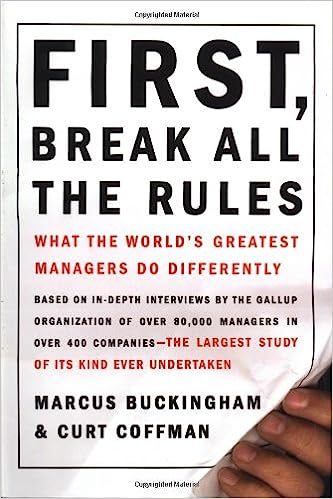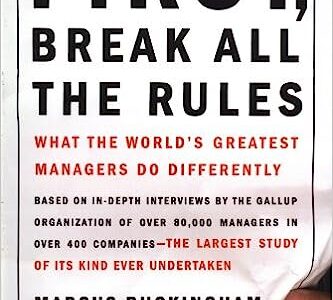These are the quotes I noted while reading First, Break All The Rules: What The World’s Greatest Managers Do Differently by Marcus Buckingham and Curt Coffman:
- People leave managers, not companies.
- The manager role is to reach inside each employee and release his unique talents into performance.
- The manager roles is the catalyst role.
- A manager must be able to do 4 activities extremely well: select a person, set expectations, motivate the person, develop the person.
- “Managers do things right. Leaders do the right thing.” This advice seems positive and developmental. It isn’t: it demeans the manager role but doesn’t succeed in doing much else. The difference between a manager and a leader is much more profound than most people think. The company that overlooks this difference will suffer for it.
- You cannot build a great team simply by selecting people based on their experience, intelligence, and determination. Defining the right steps and fixing people’s weaknesses are not the most effective way to generate sustained performance. And preparing someone for the next rung on the ladder completely misses the essence of “development”.
- The key to excellent performance is finding the match between your talents and your role.
- You must never confuse talent with skills and knowledge. If you do, you may waste a great deal of time and money trying to teach something that is fundamentally unteachable.
- Most habits are our first nature. Most habits are talents. If you are habitually assertive or habitually empathetic or habitually competitive, then you are going to have a tough time changing these habits. They are enduring. They make you You. It’s potentially disastrous to suggest that the only way to become more effective is to try to change your first nature.
- “No matter how you total success in the coaching profession, it all comes down to a single factor – talent. Although not every coach can win consistently with talent, no coach can win without it.” – John Wooden
- The most efficient route that nature has found from point A to point B is rarely a straight line. It is always the path of least resistance. The most efficient way to turn someone’s talent into performance is to help him find his own path of least resistance toward the desired outcomes.
- Unrestrained empowerment can be a value killer.
- Required steps are only useful if they do not obscure the desired outcome.
- Required steps only prevent dissatisfaction. They cannot drive customer satisfaction.
- Customers will feel a sense of partnership only when employees are responsive.
- A bad relationship is rarely one where your partner didn’t know you very well. Most often, a bad relationship is one where your partner came to know you very well indeed… and wished you weren’t that way.
- The time you spend with your best is, quite simply, your most productive time.
- You cannot learn very much about excellence from studying failure.
- Excellence is not the opposite of failure. It is just different. It has its own configuration, which sometimes includes behaviors that look surprisingly similar to the behaviors of your strugglers.
- Don’t use average performance as the barometer against which each person’s performance is judged. Use excellence. Average is irrelevant to excellence.
- The only people who are ever going to reach excellence are those employees who are already above average.
- Counterintuitively, employees who are always performing above average have the greatest room for growth.
- Poor performance must be confronted head-on.
- You have many more nontalents than you do talents, but most of them are irrelevant. You should ignore them. However, a nontalent can mutate into a weakness. A nontalent becomes a weakness when you find yourself in a role where success depends on your excelling in an area that is a nontalent.
- You succeed by finding ways to capitalize on who you are, not by trying to fix who you aren’t.
- Know when it is time to fix the casting error and stop trying to fix the person.
- Most employees are promoted to their level of incompetence. It’s inevitable. It’s built into the system.
- In most cases, no matter what it is, if you measure it and reward it, people will try to excel at it.
- Some roles performed excellently are more valuable than roles higher up the ladder performed averagely. The perfect pay plan must be sophisticated enough to reflect this overlap.
- A person’s unaided response to an open-ended question is powerfully predictive. Trust it, no matter how much you might want to hear something else.
- An employee may join a company because of its prestige and reputation, but his relationship with his immediate manager determines how long he stays and how productive he is while he is there.
- A company will be able to create a growing number of loyal customers only if its brand experience matches or exceeds its brand promise.
- When selecting employees, companies have spent far too much time and money focusing on the skills and knowledge of employees and not nearly enough on their talents.

